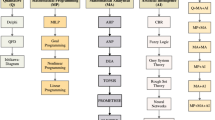Abstract
TRIZ methods have been developed and are widely used to solve problems. But one of the recognized limitations of these methods is the way to identify the priority problem to consider. This step of problem-solving process corresponds to the Analysis of Initial Situation, and has been developed as a part of the first versions of ARIZ, but then not pursued to be developed as an independent process. In this article, the authors aim is to develop a method enabling this identification of the priority problem, out of qualitative information, based on problem experts’ interviews. The proposal is based on the exploitation of the OTSM-TRIZ Network of Problems in order to build a Network of Parameters. This second network is a graphical representation of all the influence relationships between the parameters of the system. This representation leads to a new understanding of the problematic situation, and to the identification of new directions for the problem solving steps. The proposed method will be illustrated on a case study related to plastics injection moulding process.
Access this chapter
Tax calculation will be finalised at checkout
Purchases are for personal use only
Similar content being viewed by others
References
Vargas-Hernandez, N., Schmidt, L.C., Okudan, G.E.: systematic ideation effectiveness study of TRIZ. J. Mech. Des. 135(10) (2013)
Ilevbare, I.M., Probert, D., Phaal, R.: A review of TRIZ, and its benefits and challenges in practice. Technovation 33(2–3), 30–37 (2013)
Petrov, V., Logic of ARIZ. TRIZ J. (2005)
Phadnis, S., Initial Situation Analysis. The TRIZ J. (2010)
Simon, H.A. Problem Forming, Problem Finding, and Problem Solving. In: 1st International Congress on Planning and Design Theory, Boston, USA (1987)
Altshuller, G.S.: The Innovation Algorithm: TRIZ, Systematic Innovation and Technical Creativity. Technical Innovation Center, Inc. ed. Worcester, MA (1999)
Khomenkho, N., De Guio, R.:OTSM network of problems for representing and analysing problem situations with computer support. In: León-Rovira, N. (ed.) Trends in Computer Aided Innovation. IFIP The International Federation for Information Processing, vol. 250, pp. 77–88.Springer, Boston (2007). https://doi.org/10.1007/978-0-387-75456-7_8
Cavallucci, D., Rousselot, F., Zanni, C.: On contradiction clouds. Procedia Eng. 9, 368–378 (2011)
Dubois, S., Eltzer, T., De Guio, R.: A dialectical based model coherent with inventive and optimization problems. Comput. Ind. 60(8), 575–583 (2009)
Lin, L., et al.: Algorithm for identifying generalized technical contradictions in experiments. J. Européen des Systèmes Automatisés (JESA) 47(4–8), 563–588 (2013)
Lin, L., et al.: An exact algorithm to extract the generalized physical contradiction. Int. J. Interact. Des. Manuf. (IJIDeM) 9(3), 185–191 (2014). https://doi.org/10.1007/s12008-014-0250-3
Rasovska, I., Dubois, S., De Guio, R.: Study of different principles for automatic identification of generalized system of contradictions out of design of experiments. In: 8th International Conference of Modeling and Simulation - MOSIM’10, pp. 1096–1101. Hammamet, Tunisia (2010)
Burgard, L., et al.: Sequential experimentation to perform the analysis of initial situation. In: Cascini, G., Vaneker, T. (eds.) TRIZ Future Conference 2011, pp. 35–45. Institute of Technology Tallaght, Dublin, Ireland (2011)
Chibane, H., S. Dubois, and R. De Guio, Innovation beyond optimization: application to cutting tool design. Comput. Ind. Eng. 154 (2021)
Zlotin, B., Zusman, A.: ARIZ on the move. Ideation International (1998). http://www.ideationtriz.com/paper_ARIZontheMove.htm
Bukhman, I. ARIZ-85C. Algorithm for inventive problem solving. structure (2012). http://www.triz.com.tw/Isak2/tutorial/+ARIZ85C_structure_example_WEB_02_22_2012.pdf
Kucharavy, D., Theory and practice of ARIZ, in materials for master of innovative design, Module 6, INSA de Strasbourg (2005)
Khomenkho, N., Ashtiani, M.: Classical TRIZ and OTSM as a scientific theoretical background for non-typical problem solving instruments. In: Gundlach, C.L., Udo, R.H. (eds.) TRIZ-Future-Conference 2007: Current Scientific and Industrial Reality, p. 73–80. Frankfurt/Main (2007)
Khomenko, N.: Introduction to OTSM-TRIZ. (Lectures of Advanced Master of Innovative Design, INSA Strasbourg, 2005) (2005)
Khomenko, N., et al.: A framework for OTSM-TRIZ-based computer support to be used in complex problem management. Int. J. Comput. Appl. Technol. 30(1), 88–104 spécial issue Trends in computer aided innovation) (2007)
Becattini, N., Borgianni, Y., Frillici, F.S.: Employing customer value criteria to address networks of contradictions in complex technical systems. Procedia CIRP 39, 73–78 (2016)
Baldussu, A., Becattini, N., Cascini, G.: Network of contradictions analysis and structured identification of critical control parameters. Procedia Eng. 9, 3–17 (2011)
Rousselot, F., Zanni-Merk, C., Cavallucci, D.: Towards a formal definition of contradiction in inventive design. Comput. Ind. 63(3), 231–242 (2012)
Cavallucci, D., Rousselot, F., Zanni, C.: Initial situation analysis through problem graph. CIRP J. Manuf. Sci. Technol. 2(4), 310–317 (2010)
Dobrusskin, C.: On the identification of contradictions using cause effect chain analysis. Procedia CIRP 39, 221–224 (2016)
Souchkov, V.V. Root conflict analysis (RCA+): structured problems and contradictions mapping (2010)
Dubois, S., Rasovska, I., De Guio, R.: Interpretation of a general model for inventive problems, the generalized system of contradictions. In: Roy, R., Shehab, E. (eds.) Competitive Design. Proceedings of the 19th CIRP Design Conference, pp. 271–276. Cranfield University Press, Cranfield (2009)
Author information
Authors and Affiliations
Corresponding author
Editor information
Editors and Affiliations
Rights and permissions
Copyright information
© 2021 IFIP International Federation for Information Processing
About this paper
Cite this paper
Dubois, S., Chibane, H., Hafer, L., Trillat, S. (2021). A Global Approach to Point Out Priority Problems Out of Experts’ Qualitative Data. In: Borgianni, Y., Brad, S., Cavallucci, D., Livotov, P. (eds) Creative Solutions for a Sustainable Development. TFC 2021. IFIP Advances in Information and Communication Technology, vol 635. Springer, Cham. https://doi.org/10.1007/978-3-030-86614-3_32
Download citation
DOI: https://doi.org/10.1007/978-3-030-86614-3_32
Published:
Publisher Name: Springer, Cham
Print ISBN: 978-3-030-86613-6
Online ISBN: 978-3-030-86614-3
eBook Packages: Computer ScienceComputer Science (R0)





